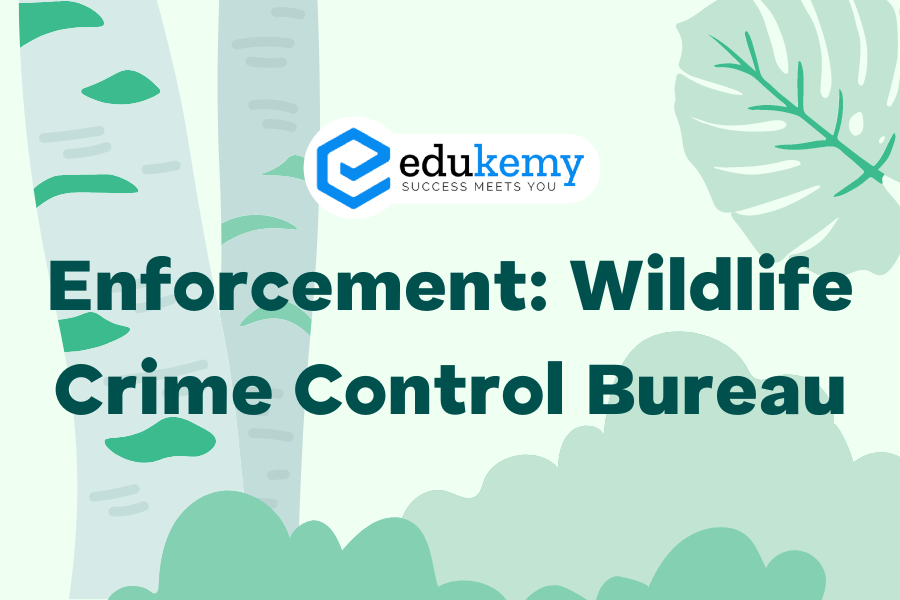- The Wildlife Crime Control Bureau (WCCB) is a statutory body established by the Indian government under the Ministry of Environment, Forests, and Climate Change to combat organized wildlife crime.
- The Bureau’s headquarters are situated in New Delhi, with additional regional offices located in Kolkata, Mumbai, Chennai, and Jabalpur.
- WCCB is mandated to create a centralized wildlife crime data bank, coordinate actions among various agencies to enforce the provisions of the Wildlife (Protection) Act, assist foreign authorities and international organizations, and gather and analyze intelligence related to organized wildlife crime activities.
Contents
VISION
The vision of WCCB is to become a world-class intelligence and enforcement agency, adhering to international standards in wildlife crime intelligence. It aims to operate as a unified team within the intelligence community, contributing to the conservation of wildlife wealth through effective intervention and deterrence against organized wildlife crime.
MISSION
WCCB’s mission includes establishing a system to gather information about wildlife crime and illegal wildlife trade in the nation, sharing intelligence for prompt and effective action, creating a database management system for better analysis and record-keeping, enforcing the Wild Life (Protection) Act of 1972, building infrastructure for enforcement personnel, and supporting international efforts to combat wildlife crime.
FUNCTIONS
The key functions of WCCB encompass collecting and compiling intelligence on organized wildlife crime, disseminating information to law enforcement agencies, coordinating actions for the enforcement of wildlife protection provisions, implementing international conventions and protocols, assisting foreign authorities and organizations, developing infrastructure for scientific investigations, advising the Government of India on wildlife crimes, and providing assistance and advice to Customs authorities regarding inspections in accordance with relevant regulations.
WCCB – Steps to Investigate a Wildlife Crime in India
- Investigation at the Crime Scene: Forest officials engage in a detailed investigation at the crime scene, documenting relevant information in a journal. They utilize specialized investigative tools to examine the site and submit all seized materials along with inspection samples to the magistrate.
- Interrogating the Accused: Within six to twelve hours of the suspect’s arrest, authorities record the suspect’s confession statement. The accused must sign each confession sheet voluntarily, without coercion or physical abuse.
- Witness Examination: Authorities, excluding assistant forest conservators, are authorized to record evidence. However, they cannot document hearsay evidence or statements made by the postmortem physician.
- Filing the Complaint: As per Section 55 of the Wildlife Protection Act of 1972, a complaint is filed with comprehensive details and sufficient evidence to substantiate the claim. No further inquiry is permissible once the complaint is lodged.
WCCB – ACHIEVEMENTS
- UN Environmental Award: The Wildlife Crime Control Bureau of India received the UN Environmental Award in 2017 for its exceptional contributions to combatting transnational environmental crimes. The recognition was bestowed twice for the successful implementation of “operation save Kurma,” targeting the illegal trade in turtles and resulting in the arrest of 350 perpetrators.
- Chief Dave Cameron Award: In 2010, the Wildlife Crime Control Bureau earned the Chief Dave Cameron Award for its dedicated efforts in addressing environmental offenses and promoting education.
- Clark R. Bavin Wildlife Law Enforcement Award: Recognizing organizations involved in sting operations and efforts to curb illegal wildlife trafficking, the Wildlife Crime Control Bureau received this award in 2010. Their accomplishment included apprehending nine poachers engaged in the black market sale of tiger and leopard skins.
The rampant poaching and illegal wildlife trade have led to a significant decline in the number of animal species in India, highlighting the urgent need to address and combat these criminal activities.
FAQs – Wildlife Crime Control Bureau (WCCB)
1. What is the Wildlife Crime Control Bureau (WCCB)?
A: The Wildlife Crime Control Bureau (WCCB) is a statutory body established by the Indian government under the Ministry of Environment, Forests, and Climate Change. It is dedicated to combating organized wildlife crime. The Bureau’s headquarters are located in New Delhi, and it operates additional regional offices in Kolkata, Mumbai, Chennai, and Jabalpur.
2. What is the mandate of the WCCB?
A: The WCCB is mandated to create a centralized wildlife crime data bank, coordinate actions among various agencies for the enforcement of the Wildlife (Protection) Act, assist foreign authorities and international organizations, and gather and analyze intelligence related to organized wildlife crime activities.
3. What is the vision of the WCCB?
A: The vision of WCCB is to become a world-class intelligence and enforcement agency, adhering to international standards in wildlife crime intelligence. It aims to operate as a unified team within the intelligence community, contributing to the conservation of wildlife wealth through effective intervention and deterrence against organized wildlife crime.
4. What is the mission of the WCCB?
A: WCCB’s mission includes establishing a system to gather information about wildlife crime and illegal wildlife trade, sharing intelligence for prompt and effective action, creating a database management system for better analysis and record-keeping, enforcing the Wild Life (Protection) Act of 1972, building infrastructure for enforcement personnel, and supporting international efforts to combat wildlife crime.
5. What are the key functions of the WCCB?
A: The key functions of WCCB encompass collecting and compiling intelligence on organized wildlife crime, disseminating information to law enforcement agencies, coordinating actions for the enforcement of wildlife protection provisions, implementing international conventions and protocols, assisting foreign authorities and organizations, developing infrastructure for scientific investigations, advising the Government of India on wildlife crimes, and providing assistance and advice to Customs authorities regarding inspections in accordance with relevant regulations.
In case you still have your doubts, contact us on 9811333901.
For UPSC Prelims Resources, Click here
For Daily Updates and Study Material:
Join our Telegram Channel – Edukemy for IAS
- 1. Learn through Videos – here
- 2. Be Exam Ready by Practicing Daily MCQs – here
- 3. Daily Newsletter – Get all your Current Affairs Covered – here
- 4. Mains Answer Writing Practice – here

